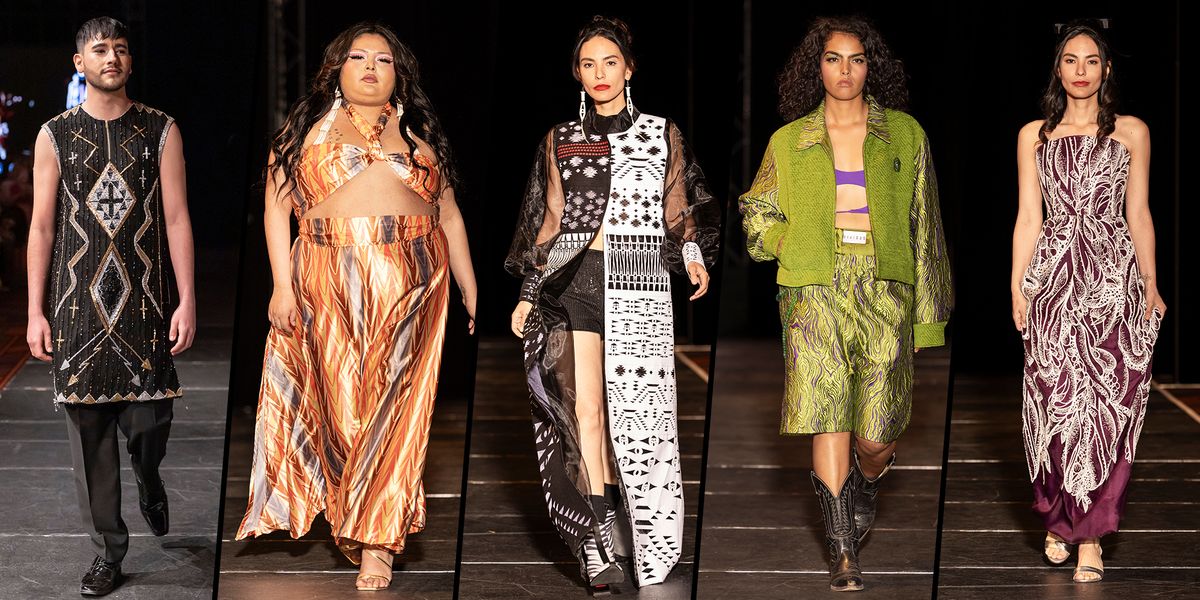Indigenous fashion is in the spotlight, thanks in large part to actresses like Lily Gladstone and models such as Quannah Chasinghorse. But it isn’t merely a passing trend. This unprecedented, and long overdue, celebration of authentic Native representation has been thousands of years in the making—and it honors long-held cultural traditions and techniques of countless tribal communities.
That diverse creativity was on full display over the weekend at the inaugural Native Fashion Week in Santa Fe, New Mexico. Presented by the Southwestern Association for Indian Arts or “SWAIA,” the nonprofit behind the popular annual Indian Market, the four-day affair featured the work of 17 different Indigenous designers. Their collections were worn by 140 models, many of whom were Native, including Killers of the Flower Moon actress Tantoo Cardinal as well as Dark Winds stars Jessica Matten and Kiowa Gordon.
“Fashion and art are a mirror to society, and there’s a push for diversity across the board right now,” SWAIA curator and fashion producer Amber-Dawn Bear Robe tells ELLE.com. “Our vision is to expand the footprint and representation of Indigenous talent in all facets of the fashion industry—including design, modeling, hair and makeup, production, and photography—and to invite people to truly invest in that vision.”
Below, five standout Native Fashion Week collections from designers paying homage to the rich cultural traditions of their respective tribal communities.
Lesley Hampton
Lesley Hampton is an acclaimed Anishinaabe/Temagami First Nation designer who has dressed actress including Lily Gladstone, Tantoo Cardinal, and Devery Jacobs of Reservation Dogs. Her work focuses on body neutrality through an Indigenous worldview. In Hampton’s new Alkaline collection, that worldview takes shape in beaded dresses, pleated maxi skirts, and flowing gowns festooned with her signature feather floral design. “I use my work as a catalyst to discover my own multifaceted identity and to comment on socio-cultural issues leading to conversation, confidence, and growth,” says Hampton, who lives in Toronto. “I believe in a fashion system where your height, hip size, and heredity isn’t appraised before it is appreciated.” That emphasis on inclusivity is reflected in the diversity of her models, proving that “high fashion can be for all bodies.”
See the collection
Shop the look
Orlando Dugi
Orlando Dugi, who has been beading since the age of six, is inspired by the Diné traditions that surrounded him growing up in the Navajo Nation. For him, everything comes down to hózhó—meaning beauty, harmony, and balance in Diné—which he says is “ingrained in my culture and ingrained in my work.” Marrying traditional techniques with modern elegance, his exquisite craftsmanship is apparent in everything he creates, from women’s eveningwear to his more recent menswear line, featuring versatile tulle tops, silk skirts, and knit pants primed for layering. “This is a significant moment for Indigenous representation,” says Dugi. “Sometimes, the only way to have space in an industry is to carve it out yourself, and that’s what [we] did.”
See the collection
Shop the look
Himikalas Pamela Baker
For more than 35 years, Himikalas Pamela Baker has been paying homage to her Squamish, Tlingit, and Musgamakw Dzawada’enuxw heritage with couture gowns and ready-to-wear pieces featuring First Nation West Coast motifs in striking colorways. She is also on a mission to educate others about tribal traditions, and to bolster confidence among Native youth on the Capilano Indian Reserve in West Vancouver, Canada, where she grew up. Her latest collection commemorates the famed craftsmanship of her Coast Salish ancestors with intricately detailed dresses, capes, and menswear in black and white with pops of what she calls “Indian red,” a nod to the fact that her show took place on National Missing and Murdered Indigenous Persons Awareness Day. With each piece of clothing and jewelry Baker crafts, she conveys a singular message: “We are still here.”
See the collection
Shop the look
House of Sutai
Nonbinary Comanche/Kiowa/Cherokee filmmaker, creative director, and model Peshawn Bread recently launched their line, House of Sutai—meaning “to bless” in Comanche—to make space in the fashion world for the Indigenous LGBTQ2S+ community. Bread is inspired by their “long line of relatives who have been creating clothing for survival, adornment, and art for years,” particularly their great aunt Josephine Myers-Wapp, who carried on the practice of finger weaving until she passed away at 102 years old. Their collection at Native Fashion Week was inspired by the disco era. Why? “The ’70s were a heightened time of political resistance when we were fighting for our rights to exist, so I wanted to create pieces that reflected what Native people could be wearing at the disco,” they say. “I wanted to give that visual cue of Indigenous joy in my collection while celebrating relatives of all sizes, genders, and skin tones.”
See the collection
Shop the look
Vividus Sports
With the motto “life well lived,” Tierra Alysia’s golf-focused Vividus Sports is equal parts fun, functional, and feminine. The Seattle-based Kashia Pomo/Filipino designer followed her brand’s launch last spring with a limited-edition runway line that honors her heritage with subtle touches like gemstones and abalone shells. That juxtaposition of street style and high fashion reflects Alysia’s own sartorial outlook. “I view the world as a magnificent melting pot with all cultures and styles contributing to the collective beauty,” she says. “In my collections, there are so many different looks for so many different types of women, yet somehow they all work together in harmony.”

























